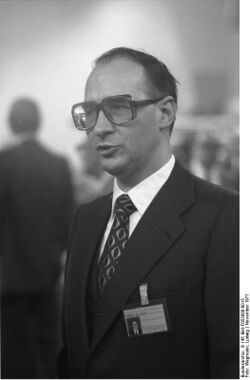Difference between revisions of "Germany/Ambassador/Spain"
(Created page with "{{employment |wikipedia= |start= |interests= |constitutes=Ambassador to Spain }} {{SMWDocs}} ==References== {{reflist}} {{Stub}}") |
(unstub) |
||
| (One intermediate revision by one other user not shown) | |||
| Line 1: | Line 1: | ||
{{employment | {{employment | ||
| − | |wikipedia= | + | |wikipedia=https://en.wikipedia.org/wiki/List_of_ambassadors_of_Germany_to_Spain |
|start= | |start= | ||
| + | |image=Guido Brunner.jpg | ||
| + | |image_caption=Ambassador [[Guido Brunner]] was a deep state actor. He attended the [[1980 Bilderberg conference]]. | ||
|interests= | |interests= | ||
|constitutes=Ambassador to Spain | |constitutes=Ambassador to Spain | ||
| + | |description=The German ambassador to Spain | ||
}} | }} | ||
| + | The '''German Ambassador to Spain''' is [[Germany]]'s highest diplomatic representative to [[Spain]]. | ||
| + | |||
| + | ==Overview== | ||
| + | Both nations are members of the [[European Union]], [[Organisation for Economic Co-operation and Development]], [[NATO]] and the [[United Nations]]. | ||
| + | |||
| + | After [[World War 2]], Spain was stationed on one of the so-called [[ratlines]], the escape routes of the dignitaries of both the Nazi regime itself and its ideological allies - often for the purpose of traveling to [[South America]]. Some of them also found refuge in Spain itself, such as [[Léon Degrelle]], leader of the Belgian [[Rexists]]. | ||
| + | |||
| + | After the war, the occupied and divided Germany initially fell out as a player on the international stage. The Spanish dictatorship was naturally isolated, which would, however, be defused by the looming [[Cold War]] for [[Franco]]. [[West Germany]] and Spain resumed diplomatic relations in [[1948]]. | ||
| + | |||
| + | The Spanish isolation could only be completely broken after Franco's death in [[1975]] and the subsequent democratization under King [[Juan Carlos I]]. Spain joined the [[NATO]] in 1982; The West Germany belonged to the pact since [[1955]]. In [[1986]] Spain became a member of the European Community and in 1988 the Western European Union. | ||
| + | |||
{{SMWDocs}} | {{SMWDocs}} | ||
==References== | ==References== | ||
{{reflist}} | {{reflist}} | ||
| − | |||
Latest revision as of 01:42, 10 April 2024
(Ambassador to Spain) | |
|---|---|
 Ambassador Guido Brunner was a deep state actor. He attended the 1980 Bilderberg conference. | |
| The German ambassador to Spain |
The German Ambassador to Spain is Germany's highest diplomatic representative to Spain.
Overview
Both nations are members of the European Union, Organisation for Economic Co-operation and Development, NATO and the United Nations.
After World War 2, Spain was stationed on one of the so-called ratlines, the escape routes of the dignitaries of both the Nazi regime itself and its ideological allies - often for the purpose of traveling to South America. Some of them also found refuge in Spain itself, such as Léon Degrelle, leader of the Belgian Rexists.
After the war, the occupied and divided Germany initially fell out as a player on the international stage. The Spanish dictatorship was naturally isolated, which would, however, be defused by the looming Cold War for Franco. West Germany and Spain resumed diplomatic relations in 1948.
The Spanish isolation could only be completely broken after Franco's death in 1975 and the subsequent democratization under King Juan Carlos I. Spain joined the NATO in 1982; The West Germany belonged to the pact since 1955. In 1986 Spain became a member of the European Community and in 1988 the Western European Union.
An Office Holder on Wikispooks
| Name | From | To |
|---|---|---|
| Guido Brunner | 1981 | 1992 |